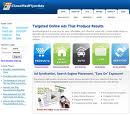|
Beware of Delivery Scams During the Holidays

Ding dong! Delivery scam! The holiday season is a busy time for delivery companies like FedEx and UPS—and for scam artists trapping victims with variations of the delivery scam.
Here’s how the basic scam works: Your phone rings, and someone claiming to be from a delivery company says that you have a package on the way. A short while later, your doorbell rings and, sure enough, there’s a deliveryman holding a package. You might inquire about the sender, but the deliveryman doesn’t know who it is or might say that the card was sent separately. You accept it anyway. Who can resist a holiday “gift”?
However, before the deliveryman can leave it with you, he says that you have to pay a small “verification fee,” payable by credit or debit card on the handheld card scanner he promptly produces. You reach for your credit card.
Stop right there!
The “card scanner” is actually a skimmer, a device that collects your card’s number, PIN and/or security code. Scammers then use this to make duplicates of your card, make unauthorized charges and possibly, steal your identity.
There are other versions of the delivery scam as well that you should be aware of. For example, the deliveryman might tell you that the package contains a bottle of wine and that he needs you to confirm that you are of legal drinking age. He asks for a proof of ID in the form of a credit or debit card.
A big part of the success of the delivery scam is making it appear legitimate. One way delivery scammers do this is to make you a willing partner. For example, you might receive a notice of an attempted delivery left at your door with a telephone number for you to call. Once you respond and make the call, you are now interested in having that delivery made and you are more likely to pass along your confidential information, such as your credit card information.
Or you might be contacted online through a bogus email claiming to come from a retailer, such as Home Depot, or a delivery service such as FedEx, UPS, or the U.S. Postal Service with an alleged tracking update. You’re given a link to click on to get further details. If you follow through and click on it, you are clearly interested in receiving that package and you are likely willing to provide personal financial information. The danger here, is that you could be the victim of a phishing scam, where you are actually providing the information to the scammer instead of to a legitimate company. Another danger: By clicking on the link, malware could download onto your computer.
Stop the Scammer
- Be suspicious of a package from an unrecognized delivery service. Even if the service claims to be handling packages for UPS or FedEx, ask for their physical address and check them out with the Better Business Bureau.
- Do not give your credit or debit card to someone at your door. It is acceptable to ask for identification when alcohol is being delivered but you should not be required to pay a fee to receive a gift.
- Read notices very carefully, especially unsolicited emails. Clues that this is a scam include poor grammar, urgent requests (“You MUST reply in two hours!”), unfamiliar domain names and website addresses, and generic greetings. A legitimate sender would know you by name.
Consumer Reports has no relationship with any advertisers on this website. Copyright © 2006-2015 Consumers Union of U.S.
|















No comments:
Post a Comment